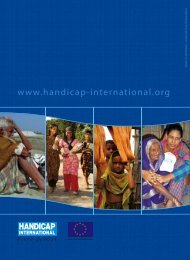Full page photo print - Harvard Law School Project on Disability
Full page photo print - Harvard Law School Project on Disability
Full page photo print - Harvard Law School Project on Disability
Create successful ePaper yourself
Turn your PDF publications into a flip-book with our unique Google optimized e-Paper software.
disability-based rati<strong>on</strong>ing of health Care<br />
The CRPD prohibits “denial of health care or health services or food and fluids <strong>on</strong> the basis<br />
of disability.” Stigma, the assumpti<strong>on</strong> that the lives of pers<strong>on</strong>s with disabilities are unhappy,<br />
unfulfilled, or not worth living, financial c<strong>on</strong>siderati<strong>on</strong>s related to providing l<strong>on</strong>g-term care, and<br />
other n<strong>on</strong>-medical factors can lead to discriminatory and very dangerous decisi<strong>on</strong>s that cost<br />
pers<strong>on</strong>s with disabilities their health or even their lives.<br />
However, health care is a scarce resource. In nearly all countries, the demand for medicines,<br />
hospital beds, doctors or other medical services outweighs the available resources to provide<br />
them. Every<strong>on</strong>e cannot receive every treatment, test or service they may desire or even<br />
require. Governments and societies must make difficult decisi<strong>on</strong>s regarding how to allocate<br />
health resources fairly am<strong>on</strong>g all members of the community. Although there are no easy<br />
answers, the principles of human rights dictate that discriminati<strong>on</strong> in health care solely <strong>on</strong> the<br />
basis of disability is a violati<strong>on</strong> of human rights.<br />
exerCise 8.4: Case studies in medical decisi<strong>on</strong>-making<br />
1. discuss:<br />
Explain that this exercise examines the ways in which disability may influence medical<br />
decisi<strong>on</strong>s. Divide participants into three groups and give each a case study. Explain that they<br />
must make a decisi<strong>on</strong> about what to do in each case.<br />
Case study 1: Two children of similar age require heart transplants. One is a child with<br />
Down Syndrome and the other is a child with no disability. Neither child has any other<br />
known medical c<strong>on</strong>diti<strong>on</strong> beside the heart-related illness. The likelihood of success of the<br />
transplant is equal for both children. The life expectancy of a pers<strong>on</strong> with Down Syndrome<br />
is generally estimated to be twenty years less than a pers<strong>on</strong> without Down Syndrome (if<br />
neither is affected by poverty, neglect or other factors that reduce life-expectancy).<br />
Based <strong>on</strong> this informati<strong>on</strong>, which child should receive the heart transplant?<br />
Case study 2: Two women who are HIV positive apply to receive expensive retroviral<br />
drugs from a public health clinic with limited resources. One woman has a chr<strong>on</strong>ic psychosocial<br />
disability; the other has no disability. The clinic can <strong>on</strong>ly support <strong>on</strong>e new client.<br />
Based <strong>on</strong> this informati<strong>on</strong>, which woman should receive the drugs?<br />
Case study 3: Two members of the same community step <strong>on</strong> landmines and lose a leg<br />
below the knee. One is a seven-year-old schoolboy and the other a farmer aged forty. Both<br />
wish to have an artificial leg, but there are resources for <strong>on</strong>ly <strong>on</strong>e to receive a prosthesis.<br />
The adult will probably be able to wear his artificial limb for many years, but the boy will out<br />
grow his several times before he reaches adulthood. The boy’s rehabilitati<strong>on</strong> will therefore<br />
be much more expensive than the man’s.<br />
Based <strong>on</strong> this informati<strong>on</strong>, who should receive the artificial leg?<br />
part 2: the COnVentiOn On the rights Of persOns with disabilities 119




